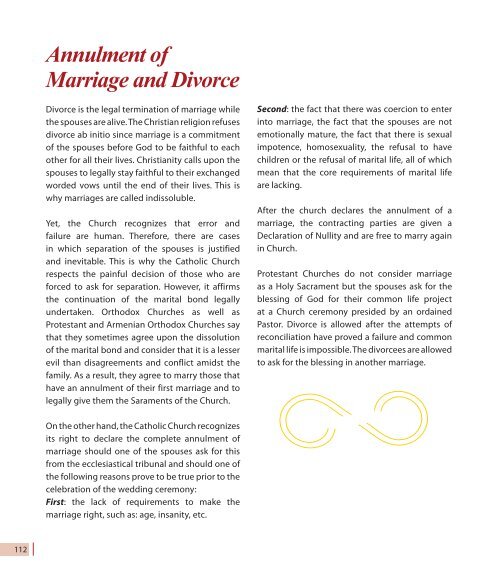Cultural aspects in Christian and Islamic religions - unesdoc - Unesco
Cultural aspects in Christian and Islamic religions - unesdoc - Unesco
Cultural aspects in Christian and Islamic religions - unesdoc - Unesco
Create successful ePaper yourself
Turn your PDF publications into a flip-book with our unique Google optimized e-Paper software.
112<br />
Annulment of<br />
Marriage <strong>and</strong> Divorce<br />
Divorce is the legal term<strong>in</strong>ation of marriage while<br />
the spouses are alive. The <strong>Christian</strong> religion refuses<br />
divorce ab <strong>in</strong>itio s<strong>in</strong>ce marriage is a commitment<br />
of the spouses before God to be faithful to each<br />
other for all their lives. <strong>Christian</strong>ity calls upon the<br />
spouses to legally stay faithful to their exchanged<br />
worded vows until the end of their lives. This is<br />
why marriages are called <strong>in</strong>dissoluble.<br />
Yet, the Church recognizes that error <strong>and</strong><br />
failure are human. Therefore, there are cases<br />
<strong>in</strong> which separation of the spouses is justified<br />
<strong>and</strong> <strong>in</strong>evitable. This is why the Catholic Church<br />
respects the pa<strong>in</strong>ful decision of those who are<br />
forced to ask for separation. However, it affirms<br />
the cont<strong>in</strong>uation of the marital bond legally<br />
undertaken. Orthodox Churches as well as<br />
Protestant <strong>and</strong> Armenian Orthodox Churches say<br />
that they sometimes agree upon the dissolution<br />
of the marital bond <strong>and</strong> consider that it is a lesser<br />
evil than disagreements <strong>and</strong> conflict amidst the<br />
family. As a result, they agree to marry those that<br />
have an annulment of their first marriage <strong>and</strong> to<br />
legally give them the Saraments of the Church.<br />
On the other h<strong>and</strong>, the Catholic Church recognizes<br />
its right to declare the complete annulment of<br />
marriage should one of the spouses ask for this<br />
from the ecclesiastical tribunal <strong>and</strong> should one of<br />
the follow<strong>in</strong>g reasons prove to be true prior to the<br />
celebration of the wedd<strong>in</strong>g ceremony:<br />
First: the lack of requirements to make the<br />
marriage right, such as: age, <strong>in</strong>sanity, etc.<br />
Second: the fact that there was coercion to enter<br />
<strong>in</strong>to marriage, the fact that the spouses are not<br />
emotionally mature, the fact that there is sexual<br />
impotence, homosexuality, the refusal to have<br />
children or the refusal of marital life, all of which<br />
mean that the core requirements of marital life<br />
are lack<strong>in</strong>g.<br />
After the church declares the annulment of a<br />
marriage, the contract<strong>in</strong>g parties are given a<br />
Declaration of Nullity <strong>and</strong> are free to marry aga<strong>in</strong><br />
<strong>in</strong> Church.<br />
Protestant Churches do not consider marriage<br />
as a Holy Sacrament but the spouses ask for the<br />
bless<strong>in</strong>g of God for their common life project<br />
at a Church ceremony presided by an orda<strong>in</strong>ed<br />
Pastor. Divorce is allowed after the attempts of<br />
reconciliation have proved a failure <strong>and</strong> common<br />
marital life is impossible. The divorcees are allowed<br />
to ask for the bless<strong>in</strong>g <strong>in</strong> another marriage.

















